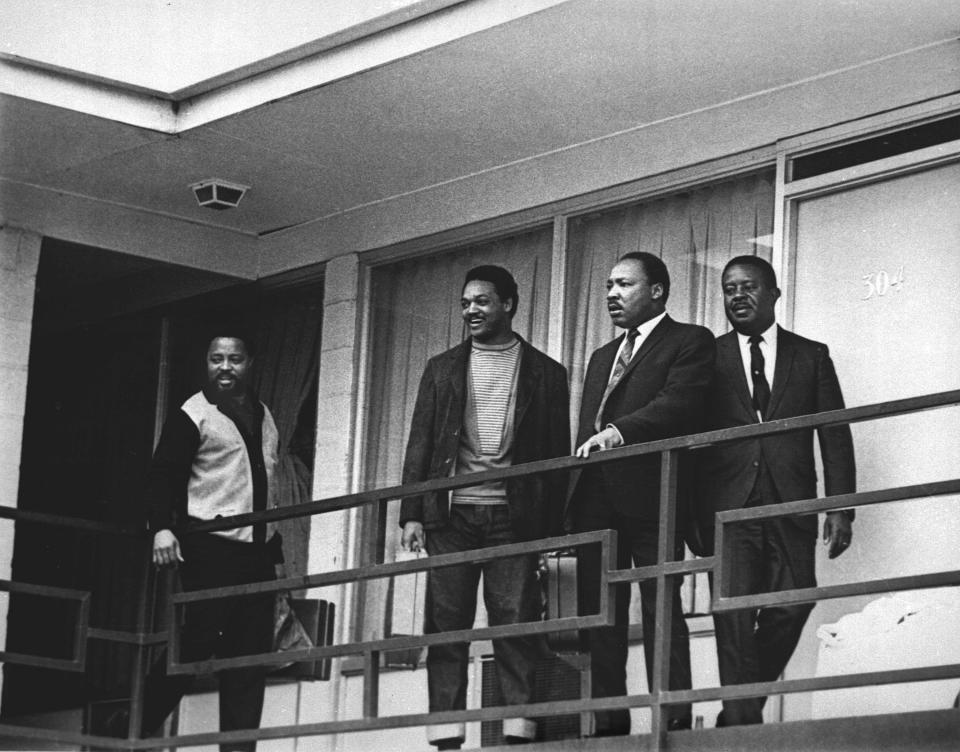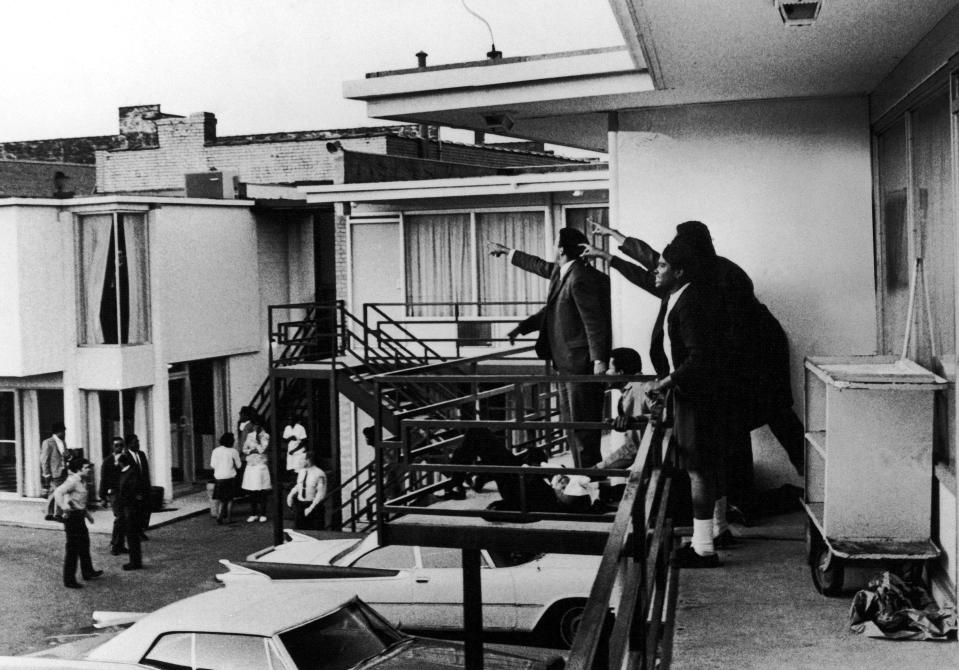Fact check: Rev. Martin Luther King Jr. died due to gunshot wound
The claim: Martin Luther King Jr. was 'killed by his doctor,' not a gunman
More than half a century after his death, conspiracy theories about the Rev. Martin Luther King Jr.'s assassination continue to circulate online.
"Martin Luther King was Killed by his DOCTOR NOT the BULLET," reads text in a Facebook post published Jan. 17, Martin Luther King Jr. Day.
The post, which includes a years-old clip from a broadcast from the Russian television network RT, accumulated more than 500 shares within two days. The video racked up more than 11,000 views.
The clip features audio from William Pepper, who is identified as a lawyer for the King family.
"He wasn't killed from the bullet that hit him on the balcony," Pepper says. "He was taken to the St. Joseph's Hospital and he was killed in the emergency room of St. Joseph's Hospital by the chief of neurosurgery, Dr. Breen Bland."
Citing the purported eyewitness account of a surgical nurse named Lula Mae Shelby, Pepper goes on to claim Bland suffocated King with a pillow.
More: King family rallies in Arizona for voting bills for MLK Day
"That's how Martin King died – that's how he was really assassinated," he says in the clip.
Versions of that claim have circulated online for years. But the revisionist history is not based in fact.
"King was murdered by a gunman," Jason Sokol, a history professor at the University of New Hampshire and author of the book "The Heavens Might Crack: The Death and Legacy of Martin Luther King Jr.," said in an email. "There is no evidence whatsoever to support the other stories you mention."
USA TODAY reached out to the Facebook user who shared the claim, as well as the Instagram user they cite as evidence, for comment.

Gunshot wound killed King
In 1979, Congress published the most authoritative report on King's death. It found he died from a gunshot wound.
The civil rights leader was shot shortly after 6 p.m. on April 4, 1968, according to the House Select Committee on Assassinations' report. He was standing on a balcony at the Lorraine Motel in Memphis, Tennessee. About an hour later, he was pronounced dead at St. Joseph's Hospital.
The Rev. Ralph Abernathy, King's close friend and confidant, was with King when he was shot and during his time in the emergency room at St. Joseph's. The Rev. Bernard Lee, another member of the Southern Christian Leadership Conference, also accompanied them.
Abernathy made it clear in his autobiography that King died in the hospital after being shot.
Special access for subscribers! Click here to sign up for our fact-check text chat
"I walked over with Bernard to where he was lying, his breathing nothing more than prolonged shudders," Abernathy wrote in "And the Walls Came Tumbling Down." "The breaths came farther and farther apart. Then, a pause came that lengthened until I knew it would never end."
Hampton Sides, author of "Hellhound on His Trail: The Electrifying Account of the Largest Manhunt in American History," told USA TODAY the notion that King somehow survived the shooting is not supported by evidence.
"The trauma from the gunshot wound was quite simply unsurvivable," Sides, whose book chronicles the aftermath of King's assassination, said in an email. "Dr. Frederick Gioia, the neurosurgeon who examined King while he was still alive, noted that the assassin’s bullet had damaged King’s jugular vein and windpipe, and then had driven down into the spinal cord, severing it completely."
After conducting an autopsy, Dr. Jerry T. Francisco, then medical examiner of Shelby County, concluded King's death was the result of a "gunshot wound to the chin and neck with a total transaction of the lower cervical and upper thoracic spinal cord and other structures of the neck," according to the House committee's report.

At the time, some critics raised questions about the thoroughness of the autopsy, according to the report. But there's no basis for the Facebook post's alternative theory of King's death.
"To say that a neurosurgeon came into the ER with a pillow and suffocated King is nothing but slander and a wholesale invention concocted years later by a discredited conspiracy buff – Pepper, who calls himself a 'doctor,' and who traffics in sensational tales," Sides said.
Pepper is an attorney who represented James Earl Ray, a convicted armed robber and escaped prison inmate, during the tail-end of his trial for King's murder.
In March 1969, Ray pleaded guilty to the first-degree murder of King. He recanted three days later but was never able to formally withdraw his guilty plea, according to the House committee's report.
Fact check: Claim about Biden quote on MLK assassination, George Floyd death is missing context
Pepper, who has previously promoted conspiracy theories related to the Sept. 11, 2001, terrorist attacks, claims King's death was the result of a vast government conspiracy.
In 1999, he represented the King family in a wrongful-death lawsuit. The jury in that trial found that a Memphis cafe owner and "others, including government agencies" were part of a conspiracy to assassinate King.
But in a review of the lawsuit, the Justice Department found no evidence to back up the verdict. (It's important to note that civil cases do not have the same burden of proof as criminal cases.)
"The assassination of Martin Luther King, Jr. is a tale full of many legitimate mysteries and unanswered questions. The cause of his death is not one of them," Sides said.
USA TODAY reached out to Pepper for comment.
Our rating: False
Based on our research, we rate FALSE the claim that King was "killed by his doctor," not a gunman. A 1979 congressional report, based in part on the results of an autopsy, found that King died due to a gunshot wound. Eyewitness accounts from those who were with the civil rights leader when he was shot back that up. Biographers say there's no evidence King was smothered in a hospital room.
Our fact-check sources:
USA TODAY, Jan. 17, Martin Luther King Jr. Day, winter storm moves east, NFL Playoffs: 5 things to know Monday
PolitiFact, Jan. 17, 2020, Fact-checking an old conspiracy about Martin Luther King Jr.’s death
NPR, April 4, 2018, Despite Swirl Of Conspiracy Theories, Investigators Say The MLK Case Is Closed
Jason Sokol, Jan. 18, Email exchange with USA TODAY
National Archives, July 17, 1979, The President John F. Kennedy Assassination Records Collection: Findings on MLK Assassination
Hampton Sides, Jan. 18, Email exchange with USA TODAY
National Civil Rights Museum, Nov. 2, 2017, BOOK TALK: THE PLOT TO KILL KING
CQ Almanac, 1979, JFK, King Assassinations
911blogger.com, Sept. 2, 2017, Dr. William F. Pepper to Speak at 9/11 Truth Film Festival - Why 9/11 Truth Still Matters (archived)
The New York Times, Dec. 9, 1999, Memphis Jury Sees Conspiracy in Martin Luther King's Killing
Ralph Abernathy, 1989, "And the Walls Came Tumbling Down"
James S. Baugess and Abbe Allen DeBolt, Dec. 12, 2011, "Encyclopedia of the Sixties: A Decade of Culture and Counterculture"
Gary Dorrien, Jan. 9, 2018, "Breaking White Supremacy: Martin Luther King Jr. and the Black Social Gospel"
James C. Klotter, 2005, "The Human Tradition in the New South"
William Pepper, June 21, 2016, "The Plot to Kill King: The Truth Behind the Assassination of Martin Luther King Jr."
Knoxville News Sentinel, March 25, 2018, Manhunt in the mountains: James Earl Ray and the Brushy Mountain Prison breakout of 1977
Department of Justice, accessed Jan. 19, VII. KING V. JOWERS CONSPIRACY ALLEGATIONS
Cornell Legal Information Institute, accessed Jan. 19, Burden of Proof
Thank you for supporting our journalism. You can subscribe to our print edition, ad-free app, or electronic newspaper replica here.
Our fact-check work is supported in part by a grant from Facebook.
This article originally appeared on USA TODAY: Fact check: Martin Luther King Jr. died due to gunshot wound

 Yahoo Movies
Yahoo Movies 
